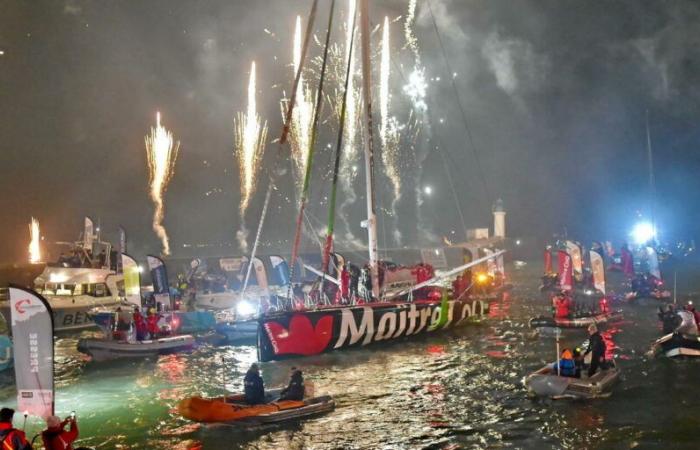OThe Vendée Globe is often said to be the Everest of sailing races. It's more than that. It is at least the entire Himalayan range that the 40 courageous people who will set off from Les Sables-d'Olonne on Sunday will have to cross. In fact, for them it is a matter of facing not only the depressions of the Atlantic, but also the passage of the Cape of Good Hope, then the icebergs of the southern Indian Ocean, before crossing Cape Leeuwin and dodge the treacheries of the Pacific before heading up the entire Atlantic after having negotiated Cape Horn, of which Alain Colas nicely said that “the wind is constantly tripping over the waves”.
More than 40,000 kilometers (21,638 nautical miles) of the most hostile oceans on the planet in just over 80 days before returning to the calm of the Chenal des Sables, where enthusiasts of this type always await them, day and night. of exploit. Out of the reach of ordinary mortals and even most sailors.
Skippers alone facing the dangers of the sea
It's number 10e edition of the Vendée Globe, which will start on November 10. A solo race, non-stop and without assistance, where the competitors are alone in the face of the countless dangers that await them. Because they will fight against winds which, in what we call the roaring forties, in the very south of the planet, reach speeds such that, combined with waves of monstrous dimensions, they are capable of breaking a boat into pieces. two.
ALSO READ “A PSG player receives better medical care than a Vendée Globe skipper”This was the case in 1996, during the third edition of the event: the Canadian Gerry Roufs disappeared in the middle of the Pacific without anyone knowing under what circumstances. Only ten years later was the overturned hull of his sailboat found. More fortunate in the same ordeal, Raphaël Dinelli saw his boat sink under his feet on Christmas Day in the south of the Indian Ocean. He owes his salvation to an Australian plane which drops a life raft for him before another competitor, the Briton Peter Goss, turns away to retrieve him. This storm in the Indian Ocean was particularly deadly that year since two other sailors, Thierry Dubois and Tony Bullimore, capsized a few days later. Both were picked up by an Australian frigate.
A record in 74 days
It must also be said that despite the often limited sailing conditions, emulation pushes competitors not to spare their machines. The winner of the first Vendée Globe, in 1989, Titouan Lamazou, completed the course in 109 days ahead of Loïck Peyron, who, however, also turned away to rescue Philippe Poupon, in difficulty. However, in 2016, Armel Le Cléac'h took only 74 days to travel around the world.
Sailors take more risks and their machines have become more efficient. The sailboats entered all belong to the Imoca class, 60-foot boats, or 18.20 m, made with very light materials, such as carbon. In recent years, a real revolution has made it possible to multiply their speed: that of foils. These are wing-shaped appendages, deployed on either side of the hull when weather permits. The sailboats then free themselves from their drag in the water and literally manage to fly. This sometimes allows them to reach speeds on the waves close to 30 knots, or 60 km/h. Which, for a machine powered solely by wind, is quite exceptional.
ALSO READ Aboard Samantha Davies' Imoca, one month before the start of the Vendée Globe
To Discover
Kangaroo of the day
Answer
But there is a downside to these performances, and that is the fragility of the boats. Breakages at these speeds are numerous, so much so that a Vendée Globe sailor is not only a good navigator, he is also a mechanic capable of repairing any damage that may affect his boat. Indeed, due to the regulations, he is the only one authorized to intervene. This is what Yves Parlier did in 2000, who, victim of a broken mast which should have led to his abandonment, decided to continue. Having taken refuge in the bay of a desert island off the coast of New Zealand, he managed to rebuild his mast and continue the race, which he finished 13efeeding on algae and the rare fish that he managed to catch because he no longer had any provisions. This feat was also recreated in the film Alone by Pierre Isoard, where Samuel Le Bihan played the role of Parlier.
Of the 40 competitors who will start on Sunday in Les Sables, not all are playing in the same league. Next to the stables of professional sailors, like Charlie Dalin on MacifYannick Bestaven on Master RoosterThomas Ruyant on Vulnerable or Yoann Richomme on Paprecthere are quasi-amateurs who do not steer foiling boats and aim less for the ranking than for the performance that having completed the Vendée Globe loop will constitute for them. Which will be, in any case, an achievement. Because everyone, adventurers on a world tour or professional runners, will experience loneliness, cold, anxiety which sometimes push them to ask themselves: “But why do I find myself here, in the middle of nowhere? »






